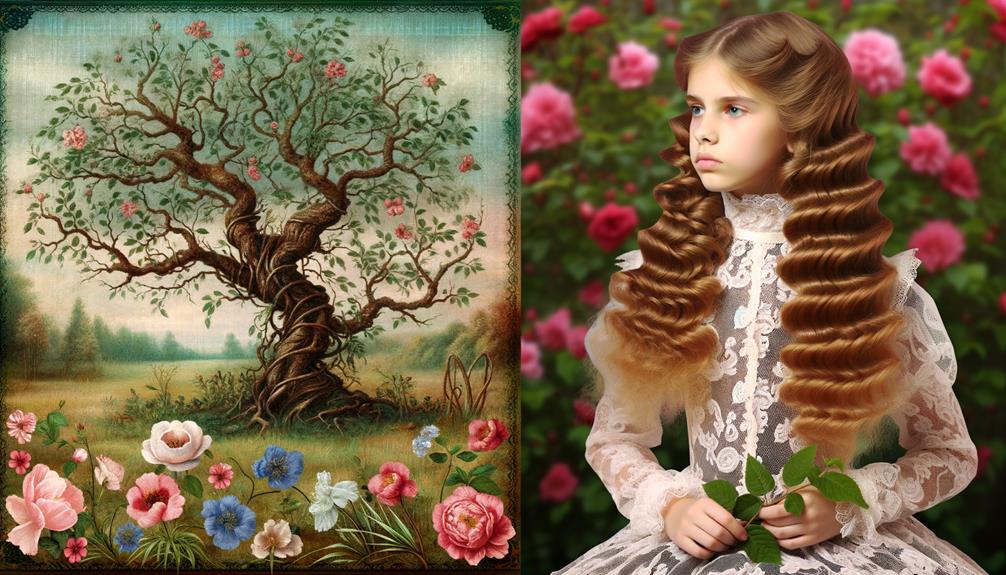Nell Name Meaning and Origin
The name 'Nell' is derived from the medieval diminutive of the Greek name 'Eleanor,' which traces back to the Old French 'Alienor' and ultimately to the Greek 'Helene,' meaning 'light' or 'torch.' Historically, 'Nell' evolved from a diminutive form to a standalone name, influenced by cultural and linguistic shifts. Its usage can be linked to notable figures like Nell Gwyn and Nell Carter.
Though its popularity has fluctuated over time, 'Nell' has seen a resurgence due to its simplicity and timeless appeal. For further insights into its cultural significance and modern adaptability, continue exploring.

Key Takeaways
- Nell is derived from the medieval diminutive of the Greek name 'Eleanor.'
- The name traces back to the Old French name 'Alienor.'
- Originates from the Greek 'Helene,' meaning 'light' or 'torch.'
- Evolved from a diminutive form to a standalone name in medieval Europe.
- Popularity fluctuated but shows modest resurgence in recent times.
Etymology of Nell
The name 'Nell' is derived from the medieval diminutive of the Greek name 'Eleanor,' which itself traces back to the Old French name 'Alienor.' This diminutive form evolved through linguistic transformations, reflecting both phonetic simplicity and cultural adaptation.
'Eleanor' originates from the Greek 'Helene,' meaning 'light' or 'torch,' which underscores a semantic lineage associated with illumination and guidance. The shift from 'Eleanor' to 'Nell' exemplifies the morphological process of truncation, common in the evolution of names.
Moreover, 'Nell' encapsulates a sense of endearment and familiarity, often used in affectionate contexts. This etymological journey highlights the adaptability and enduring nature of the name, underscoring its historical and linguistic significance across various cultures and epochs.
Historical Background
The historical background of the name Nell can be traced to early usage records dating back to medieval Europe, where it often appeared in diminutive forms of Eleanor and Helen.
Over time, the cultural significance of Nell has shifted, reflecting changes in social and linguistic practices.
Prominent historical figures bearing the name have further influenced its evolution and enduring appeal.
Early Usage Records
Historical records indicate that the name Nell first appeared in medieval England, often derived as a diminutive of names such as Eleanor and Helen. The earliest documented instances date back to the 12th and 13th centuries, where it was primarily used in both legal documents and literary works.
Linguistic evidence suggests that Nell evolved from the affectionate truncation of these longer names, a common practice in medieval nomenclature. In parish registers, wills, and early censuses, Nell appears with increasing frequency, reflecting its growing acceptance and usage among various social strata.
This diminutive form was favored for its simplicity and ease of use, illustrating the broader trend of name shortening that was prevalent during this historical period.
Cultural Significance Shifts
Over the centuries, the name Nell evolved from a diminutive form to a standalone name, reflecting broader cultural shifts and changing naming conventions in society.
Historically, diminutives were often used within families and close-knit communities, implying affection and familiarity. However, as societal norms transformed, particularly during the Victorian era, there was a notable shift towards the formal recognition of these diminutives as proper names. This shift illustrates the evolving dynamics of personal identity and cultural expression.
Additionally, the simplification of names can be linked to burgeoning literacy rates and the democratization of naming practices, wherein individuals sought to establish distinct personal identities. Consequently, Nell's evolution underscores the interplay between linguistic trends and societal changes in naming traditions.
Prominent Historical Figures
Prominent figures named Nell have emerged through history, leaving significant imprints on various cultural and social spheres. Nell Gwyn, a renowned actress and mistress of King Charles II, exemplifies the name's historical resonance in the 17th century. Her influence extended beyond the theater, impacting royal court dynamics and popular entertainment.
Similarly, Nellie Bly, born Elizabeth Cochran Seaman, revolutionized journalism in the late 19th century with her pioneering investigative reporting. Her courageous journey around the world in 72 days remains a tribute to her audacity and intellect.
These historical figures named Nell or its variants underscore the name's association with notable contributions and enduring legacies in diverse fields, from performing arts to journalism.
Cultural Significance
The name Nell holds substantial cultural significance, rooted in its historical context and widespread usage across various periods.
Its presence in literature and media further underscores its cultural resonance, as seen in characters that embody diverse narratives and societal roles.
Analyzing these aspects reveals how the name Nell has maintained its relevance and adaptability within different cultural frameworks.
Historical Context and Usage
Throughout history, the name Nell has exhibited significant cultural relevance, often associated with various literary characters and historical figures. Originating as a diminutive of Eleanor or Helen, Nell has been utilized across diverse cultures and time periods. Its usage can be traced back to the medieval era, where it was commonly found among English-speaking populations. The name Nell also carries a certain elegance and simplicity, making it appealing across different societal strata. In the 19th century, it saw a resurgence in popularity, particularly in the United States. Below is a table summarizing key historical contexts:
| Time Period | Region | Cultural Significance |
|---|---|---|
| Medieval | England | Common among English-speaking people |
| 19th Century | United States | Resurgence in popularity |
| Modern Era | Global | Maintains a charm and simplicity |
Literary and Media References
Building on its historical significance, the name Nell has also garnered substantial cultural resonance through its representation in literature and media. One notable example is Charles Dickens' character Little Nell from 'The Old Curiosity Shop,' whose innocence and tragic fate have made her an enduring literary figure.
In contemporary media, the 1994 film 'Nell,' starring Jodie Foster, further cemented the name's cultural footprint by portraying a woman who communicates in an invented language, symbolizing themes of isolation and resilience. Additionally, Nell Trent in “The Haunting of Hill House” by Shirley Jackson exemplifies the name's continued association with poignant, complex characters.
These representations underscore Nell's multifaceted cultural significance, enriching its narrative beyond mere nomenclature.
Famous Namesakes
Notably, several distinguished individuals bearing the name Nell have made important contributions to various fields, underscoring the name's enduring cultural impact.
Among them, Nell Gwyn, a famed actress and mistress of King Charles II, is notable for her influence in 17th-century British society and the arts.
Another prominent figure is Nell Carter, an American singer and actress renowned for her work in television and theater, particularly her role in the sitcom 'Gimme a Break!'
Additionally, Nell Irvin Painter, an esteemed historian and author, has made notable strides in the academic world with her scholarship on American history and race.
These illustrious examples highlight the name's association with impactful and diverse achievements.
Popularity Over Time
Analyzing the popularity of the name Nell over time reveals fluctuating trends influenced by cultural, historical, and social factors.
Historically, the name Nell experienced notable peaks and troughs. During the late 19th and early 20th centuries, it was relatively common, reflecting societal trends of simpler, classic names. By the mid-20th century, its usage declined, coinciding with a shift towards more modern and diverse names. Recently, there has been a modest resurgence, possibly due to a renewed appreciation for vintage names.
Key factors influencing these fluctuations include:
- Cultural shifts: Changes in naming conventions and preferences.
- Historical events: Periods of significant societal change impacting name choices.
- Media influence: Representation in literature, film, and popular culture.
This analysis underscores the dynamic nature of name popularity.
Variations and Nicknames
Examining the variations and nicknames of the name Nell provides further insight into its adaptability and enduring charm across different cultures and time periods. Deriving from Eleanor and Helen, Nell has several diminutives and variants.
In English, common nicknames include Nelly and Nellie, which add an endearing aspect to the name. Other cultural adaptations include the French 'Nelle' and the Dutch 'Nel'. Each variant retains the core simplicity and elegance of Nell while reflecting phonetic and cultural nuances.
Additionally, Nell has been used as a standalone name, showcasing its versatility. This plethora of variations and nicknames demonstrates the name's linguistic flexibility and its capacity to be personalized, making it a timeless choice for many.
Modern Usage
In contemporary nomenclature, the name Nell maintains its appeal through a blend of traditional charm and modern simplicity. Its enduring popularity can be attributed to several factors:
- Versatility: Nell seamlessly fits in both formal and casual contexts.
- Cultural Resonance: The name retains a historical richness, often evoking literary and artistic associations.
- Ease of Use: Its brevity and straightforward pronunciation make it accessible across diverse linguistic backgrounds.
The name Nell is increasingly favored by parents seeking a name that is both timeless and contemporary. It strikes a balance, offering a nod to the past while fitting comfortably into present-day naming trends. Consequently, Nell's usage continues to thrive in various socio-cultural settings, underscoring its enduring relevance.
Conclusion
In the grand tapestry of names, 'Nell' emerges as a thread woven with rich etymological roots, historical resonance, and cultural significance. Its enduring popularity, bolstered by illustrious namesakes and diverse variations, underscores its timeless appeal.
Through the lens of modern usage, 'Nell' continues to captivate, reflecting both tradition and contemporary charm. Consequently, 'Nell' not only encapsulates a storied past but also promises a vibrant future, standing as a tribute to the enduring allure of names.






